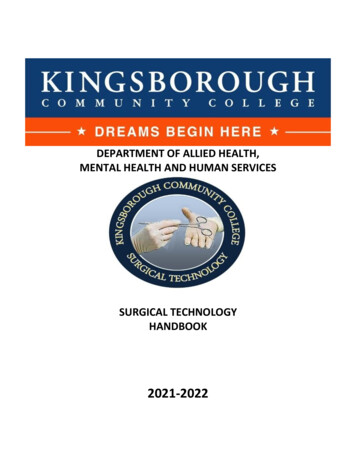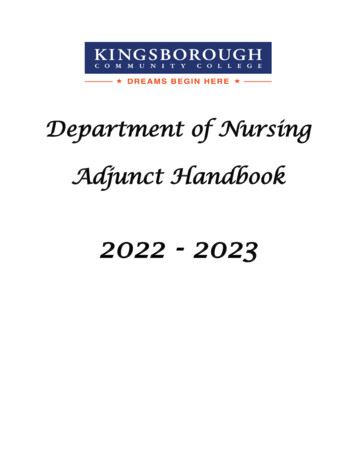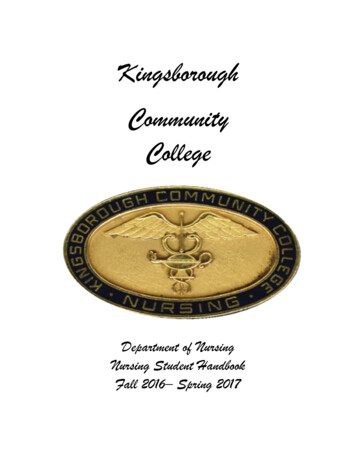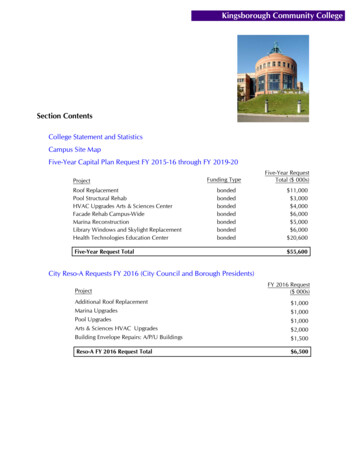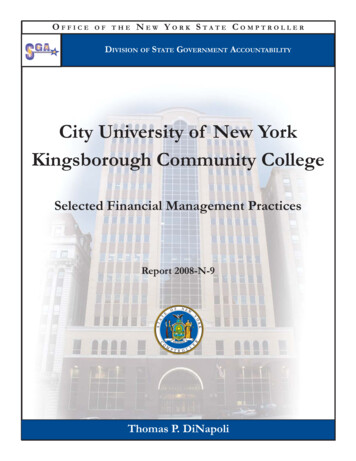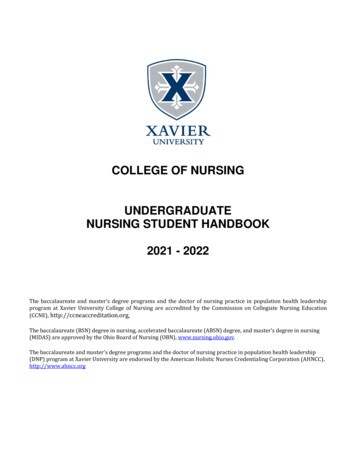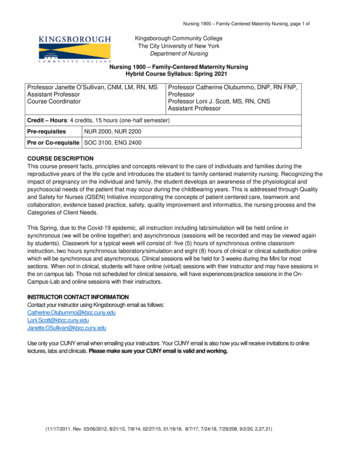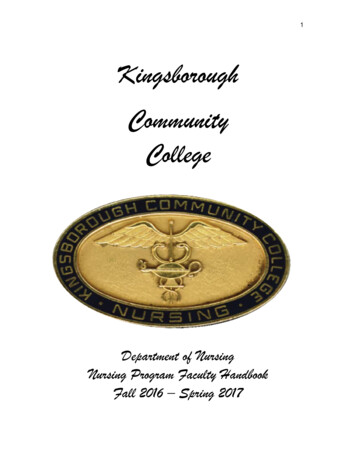
Transcription
1KingsboroughCommunityCollegeDepartment of NursingNursing Program Faculty HandbookFall 2016 – Spring 2017
2The Department of Nursing, Nursing Program Faculty Handbook has been developed toprovide information regarding the Nursing mission, organizational framework andoutcomes; roles and responsibilities of all Faculty and staff; and essential policies andprocedures of the both the Nursing Program and Department. The primary outcomes areto graduate students with the requisite knowledge and skills to pass NCLEX-RN andfunction as beginning practitioners in Nursing.Kingsborough Community College is accredited by the Middle States Commission onHigher Education and offers a Nursing Program that is approved by the New York StateEducation Department. This nursing education program is accredited by theAccreditation Commission for Education in Nursing; 3343 Peachtree Road NE, Suite850, Atlanta, Georgia 30326. The graduate receives an Associate in Applied ScienceDegree and is eligible to take the National Council Licensure Examination for RegisteredNurses (NCLEX-RN).
3Table of ContentsNURSING PROGRAM INFORMATION. 6Mission Statement .6Nursing Program Outcomes.6Program Student Learning Outcomes . 6Role Specific Graduate Competencies . 6Organizational Framework .7The QSEN Competencies are:.7The NCLEX Test Plan Categories of Patient Care Need are:. 8Role of the Associate Degree Nurse (ADN) . 8ADMISSION POLICIES.9Entrance Requ irements .9Notice to Students on Criminal Background Checks . 10Advanced Placement for Licensed Practical Nurses . 11Pre and Co-requisites: . 11CRITERIA FOR RETENTION IN THE NURSING PROGRAM . 11TABLE OF ORGANIZATION OF THE NURSING DEPARTMENT . 13Responsibilities of Chairperson. 13Responsibilities of Deputy Chairperson . 13Responsibilities of Deputy Chairperson for Clinical Affiliations . 14Responsibilities of Course Coordinator: . 14Qualifications And Responsibilities Of Full-Time Faculty. 15Qualifications Of Part-Time Faculty. 16Teaching Load .17Report of Absence . 17Office Hours.17CUNYfirst.17Student Advisement . 17Degree Audit .17Student Course History . 18Student Grading. 18Class Rosters .18Counseling.19Health, CPR and Malpractice Requirements . 19Committee Minutes . 19Staff Positions and Responsibilities . 20Responsibilities of Coordinator of Nursing Learning Resources (CNLR) . 20Responsibilities of the Senior College Laboratory Technician (SCLT) . 20Administrative Staff . 21Responsibilities of the Administrative Coordinator (aHEO) . 21Responsibilities of the CUNY Office Assistant . 21CLINICAL GUIDELINES FOR FACULTY . 22Student Assignments . 22Student Responsibilities. 22Fatigue .23Student Evaluation . 23Faculty Responsibilities In The Clinical Area. 23TESTING POLICIES . 24Administering Unit Exams . 24
4Retention of Exams . 25Grading Policies for Nursing Courses . 25STUDENT DOCUMENTATION . 26Attendance and Grade Record (Gray and White form). 26COA Roster .26Grade Work Sheets . 26E-grading .26Proctoring .26End of Semester Grade Submission . 27Change of Grade Form . 27STANDING COMMITTEES . 27College Committees: . 27College Committee on Faculty, Personnel, and Budget. 27College Committee on Admissions and Academic Standing. 27College Committee on Academic Review . 28The College Council . 28NURSING DEPARTMENTAL & PROGRAM COMMITTEES BYLAWS . 28Voting Committees . 28Nursing Department Committee . 28Nursing Program Committee . 29Nursing Program Curriculum Committee . 30Admission, Progression and Retention Committee . 30Personnel and Budget Committee . 31Test Item Committee . 32Non-Voting Committees . 32Nursing Program Assessment Committee . 32Faculty Development Committee . 33Technology Committee . 34Grant Development Committee . 34Nursing Club .34Social Committee . 35Liaisons .35FACULTY COMMUNICATIONS AND ENRICHMENT . 36Voice mail .36Keys .36Bursar-Parking . 36E-mail .36Operations Work Request: . 37Security – ID Cards. 37Environmental Health and Safety. 37Participation in College Life . 37Attendance at Conferences/Personal Expense Record/Travel Expenses: . 37Instructional Support services . 38Kingsborough Center for e-Learning (KCeL) . 38KCTL – Kingsborough Center for Teaching and Learning . 38Office Services . 38Blackboard .38Library/Media/Computer Center/Tutoring . 39Accessing Library Resources . 40Bookstore: .40
5Evaluations .40Student Program Opinion Survey/Course Opinion Survey . 40Graduate Opinion Survey . 40Faculty Opinion Survey . 40Clinical Agency Evaluation . 40Employer Opinion Survey . 41Evaluation of Teaching . 41Observations . 41Student Evaluation of Teaching . 41Personnel Files – Office of Human Resources (non-tenured and Adjunct Faculty;Office of Academic Affairs (Tenured Faculty) . 41Promotion and Tenure . 42KINGSBOROUGH INFORMATION & POLICIES . 42Distance Learning . 42Civic Engagement. 42Affirmative Action . 42Sexual Harassment . 43Computer Resources . 43Students with Disabilities . 44Emergency Notification System . 44Student Complaints . 44The federal family educational rights and privacy act (ferpa) . 45Academic Integrity . 46Attendance Policy . 47Netiquette .47Civility .47Plagiarism .47
6NURSING PROGRAM INFORMATIONMISSION STATEMENTThe mission of the Nursing Program at Kingsborough Community College is to developcompetent Professional Nurses who are eligible for licensure. An appropriate balancebetween general education and Nursing courses prepares students with thecompetencies to provide safe, caring, patient-centered, evidenced-based Nursing careto culturally diverse populations. Graduates are prepared for entry into practice,articulation with institutions of higher learning, and engagement in life-long learning. Theadministration and Faculty are committed to offering a superior education to Nursingstudents that will prepare them to practice as Professional Nurses in accordance withnational standardsNURSING PROGRAM OUTCOMESAt a minimum, the Kingsborough Community College Nursing Program will achieve thefollowing outcomes: Achieve the national mean pass rate percentage for first time test takers on theNCLEX-RN examination.75% of graduates will have completed the Clinical Component of the programwithin three years of beginning Clinical Nursing courses.Secure program satisfaction by graduates at a level of 80%.Secure program satisfaction by employers at a level of 80%.Realize a graduate job placement rate of 75%.PROGRAM STUDENT LEARNING OUTCOMESUpon completion of the Kingsborough Community College Nursing Program, utilizing theNursing Process, the student: Provides safe, caring, patient-centered, evidence based Nursing care to adiverse population of patients.Employs critical reasoning strategies.Engages in teamwork and collaboration with members of the intra-professionalteam.Employs informatics principles, techniques and systems when providing Nursingcare.Demonstrates leadership/management in a variety of healthcare settings for thepurpose of providing and improving patient care.Applies professional, ethical and legal principles relevant to the practice of aregistered nurse.ROLE SPECIFIC GRADUATE COMPETENCIESUpon completion of the Kingsborough Community College Nursing Program thegraduate will demonstrate competency in the following areas:1. Safe, Evidence-Based Care.
72.3.4.5.6.Critical ement.Legal/Ethical/Advocacy.ORGANIZATIONAL FRAMEWORKTo realize the Nursing Program’s Mission, Program Outcomes, Student LearningOutcomes, and Role Specific Graduate Competencies the curriculum is grounded inrecognized contemporary professional standards, guidelines and competencies whichinclude ACEN 2013 Standards and Criteria for Associate Degree Nursing, NLNAssociate Degree Competencies, ANA Standards of Nursing Practice, New York StateNurse Practice Act, National Council of State Boards for Nursing’s (NCSBN) NCLEX-RNTest Plan Categories of Client Needs, The Joint Commission (TJC) National PatientSafety Goals (2015), and Quality and Safety for Nurses (QSEN) Competencies.The QSEN Competencies together with the NCLEX-RN Categories of Client Needsprovide the major unifying themes for application of the Nursing Process and for contentand student learning throughout the curriculum. These are introduced in the firstsemester of the Nursing Program’s Clinical Component and are applied at increasinglycomplex levels in successive semesters in the classroom, laboratory and clinicalsettings. The Student Learning Outcomes organize the curriculum, guide the delivery ofinstruction and learning activities, and are used to evaluate student progress. TheNursing curriculum and Student Learning Outcomes advance from simple to complexutilizing Bloom’s revised Taxonomy of Learning Objectives. Course Outcomes aresubsequently derived from the Student Learning Outcomes and reflect specific coursecontent advancing from simple to complex. The following table demonstrates correlationof the Student Learning Outcomes and Role Specific Graduate Competencies with themajor unifying professional standards and guidelines used in the development of theNursing curriculum.THE QSEN COMPETENCIES ARE: Patient Centered Care: Recognize the patient or designee as the course of controland full partner in providing compassionate and coordinated care based on respectfor patient’s preferences, values and needs. Evidence Based Practice: Integrate best current evidence with clinical expertiseand patient/family preferences and values for the delivery of optimal health care. Team Work and Collaboration: Function effectively within Nursing and interprofessional teams, fostering open communication, mutual respect and shareddecision making to achieve quality patient care. Quality Improvement: Use data to monitor the outcomes of care processes and useimprovement methods to design and test changes to continuously improve thequality and safety of health care systems. Safety: Minimize risk of harm to patients and providers through both systemeffectiveness and individual performance. Informatics: Use information and technology to communicate, manage knowledge,mitigate error and support decision making.
8THE NCLEX TEST PLAN CATEGORIES OF PATIENT CARE NEED ARE: Safe And Effective Care Environment:Promote achievement of patientoutcomes by providing and directing Nursing care that enhances the care deliverysetting in order to protect patients and health care personnel.o Management of Care: Provide and direct Nursing care that enhances thecare delivery setting in order to protect patients and health care personnel.o Safety and Infection Control: Protect patients and health care personnelfrom health and environmental hazards.Health Promotion and Maintenance: Provide and direct Nursing care of the patientthat incorporates the knowledge of expected growth and development principles,prevention and/or early detection of health problems, and strategies to achieveoptimum health.Psychosocial Integrity: Provide and direct Nursing care that promotes andsupports the emotional, mental and social well being of the patient experiencingstressful events, as well as patients with acute or chronic mental illness.Physiological Integrity: Promote physical health and wellness by providing careand comfort, reducing patient risk potential and managing health alterations.o Basic Care and Comfort:Provide comfort and assistance in theperformance of activities of daily living.o Pharmacological and Parenteral Therapies: Provide care related to theadministration of medications and parenteral therapies.o Reduction of Risk Potential: Reduce the likelihood that patients willdevelop complications related to existing conditions, treatments orprocedures.o Physiological Adaptation: Manage and provide care for patients withacute, chronic or life threatening conditions.The QSEN Competencies and NCLEX Categories of Patient Care are addressed eachsemester and build upon one another. They are incorporated into Nursing courses andare used in classroom, laboratory and clinical settings throughout the Nursing courses.The Nursing Faculty integrates Knowles Theory of Adult Education in applyingeducational theory appropriate for student learning. This theory promotes thedevelopment of critical thinking, clinical judgment, and the delivery of excellence inpatient-centered care to adult students who make up the major demographic in theNursing Program.ROLE OF THE ASSOCIATE DEGREE NURSE (ADN)Nursing practice takes place at differentiated levels. The Associate Degree Nurse is anentry-level practitioner and is competent to practice as a direct caregiver in a variety ofhealth care settings, which include diverse patient populations. The ADN practices in theroles of provider of care, manager of care, and member within the discipline of Nursing.The ADN graduate is prepared to provide care for groups of individuals with multipleproblems and with a high level of acuity in multiple settings using current standards ofcare and research findings to inform and guide his/her Nursing practice. The ADNgraduate is also equipped with the ability to perform proficiently in an increasinglytechnological healthcare arena. The practice of the ADN is consistent with theguidelines of the Nurse Practice Act and the American Nurses Association Code ofEthics.
9The ADN uses effective communication skills and collaborates with patients and otherhealth team members to coordinate care. The ADN prioritizes and delegates thedelivery of nursing care and evaluates outcomes. The ADN graduates are employed in ahealth care delivery system that continues to grow and change. As a result, ADNgraduates are encouraged to pursue bachelors, masters and doctoral degrees inpreparation for advanced levels of practice.ADMISSION POLICIESENTRANCE REQU IREMENTSTo be considered for the Clinical Component of the Nursing Program, a student mustcomply with the following:1. be enrolled in the Pre-Clinical Component. A student must complete anapplication for Pre-Clinical Nursing during the period noted on the AcademicCalendar. The application is obtained in the Registrar’s Office. The studentmust see a nursing advisor to discuss their academic performance and obtain aadvisor’s signature on the application. The application is submitted to the NursingDepartment (M401);2. pass the CUNY Reading and Writing exams and parts 1 and 2 of the COMPASSMath Skills Test and/or complete any required remediation before completion ofthe four (4) courses in the Pre-Clinical Sequence;3. complete the four (4) courses in the Pre-Clinical Sequence: ENG 1200, PSY1100, BIO 1100 and SCI 2500;4. complete the four courses the Pre-Clinical Sequence with at least a grade pointaverage of 2.5 and earn at least two (2) Bs (one of which must be in SCI 2500 orBIO 1100);5. the student who has repeated and/or withdrawn from any of the Pre-ClinicalSequence courses may not be considered for admission to the Nursing program;6. all grades received for courses taken in the Pre-Clinical Sequence atKingsborough will be included in the Pre-Clinical average computation;7. submit transcripts from other colleges (NOTE: Letter grades received in the PreClinical Sequence courses at other colleges will be used to determine eligibilityfor admission); any biological science course more than 10 years old will not beaccepted for exemption or credit;8. perform satisfactorily on the Test of Academic Skills (TEAS) exam.9. the transfer student from other colleges must be in good academic standing. Astudent who is on academic probation or has been administratively dismissedfrom a Nursing program at a previous school is not eligible for admission to theNursing program.The student must also earn a minimum of a “C” grade in all co-requisite courses.PLEASE NOTE WELL: All current CUNY Clinical Nursing students must providedocumentation as to legal status in one of these categories: U.S. Citizenship. Permanent residency. International Student with F1 status. Granted Asylum, Refugee Status, Temporary protected Status, Withholding ofRemoval, or Deferred Action Status by the U.S. Government.
10NOTICE TO STUDENTS ON CRIMINAL BACKGROUND CHECKS--Current laws generally permit a state licensing board or agency to deny a licenseto practice nursing if the applicant has been convicted of a felony or otherspecified crime. Like many state licensing boards, the Office of the Professionsof the New York State Education Department requires that a criminal backgroundcheck be conducted prior to granting a license to practice nursing.The Department of Nursing at Kingsborough Community College does notrequire a criminal background check for admittance, but the Department’seducational requirements include placement at one or more hospitals or otheroff-campus clinical training sites and these sites frequently require a student toundergo a criminal background check before the student can be placed forclinical training. If, based upon the results of a criminal background check, thesite determines that a student’s participation in its clinical training program wouldnot be in the best interest of the site, the site may deny that student admission tothe training program. Even if the student has already begun the placement whenthe results are received, the site may elect to dismiss the student, regardless ofthe student’s performance while in the training program.-Each clinical training site that requires a criminal background check sets its ownstandards and procedures and you may be asked by the site to pay the cost ofthe background check. You may also have to complete more than one criminalbackground check during the course of the Nursing Program at KingsboroughCommunity College, depending on the number of sites where you are placed andthe requirements of each site.-Please note that if a clinical training site determines that you may not take part inits training program based on the results of the criminal background check, youmay be unable to complete your course requirements and to continue in theNursing program. IT IS IMPORTANT FOR YOU TO CONSIDER THIS BEFOREYOU ENROLL IN THE NURSING PROGRAM. Kingsborough CommunityCollege has no obligation to refund your tuition or fees or to otherwiseaccommodate you in the event you are ineligible to complete your courserequirements based on the results of a criminal background check, or if you aredenied a license to practice nursing.Students who successfully complete the prescribed Pre-Clinical Sequencerequirements must file for an application to take the ATI-TEAS exam and anapplication for acceptance into the Clinical Component of the Nursing Program.Completion of the above requirements does not guarantee admission into theClinical Component; Admission to the Clinical Component is based on spaceavailability, the Pre-Clinical Sequence grade point average and Test of AcademicSkills (TEAS) results. Candidates are ranked based on their Pre-Clinical GPA andthe Test of Academic Skills (TEAS) results.Application forms and specific filing dates for the Clinical Component of theNursing Program are available in the Nursing Department Office, MAC 401. Thecompleted form should be filed in that office during the Spring or Fall semesters in whichthe student expects to complete the Pre-Clinical requirements. Students completing therequirements during the Summer or Winter modules should file their application in thefollowing Fall or Spring semester.
11ADVANCED PLACEMENT FOR LICENSED PRACTICAL NURSESLicensed practical nurses (LPN) who are accepted into the Clinical Component mayreceive credit for NUR 1800 (Fundamentals of Nursing) by earning a score of Level 2 orbetter on the ATI Proctored RN Fundamentals Exam. These candidates may receivecredit for NUR 1700 (Calculations for Medication Administration) by achieving a grade of"B" or better on the Department of Nursing’s NUR
The mission of the Nursing Program at Kingsborough Community College is to develop competent Professional Nurses who are eligible for licensure. An appropriate balance between general education and Nursing courses prepares students with the competencies to provide safe, caring, patient-centered, evidencedbased Nursing care -
